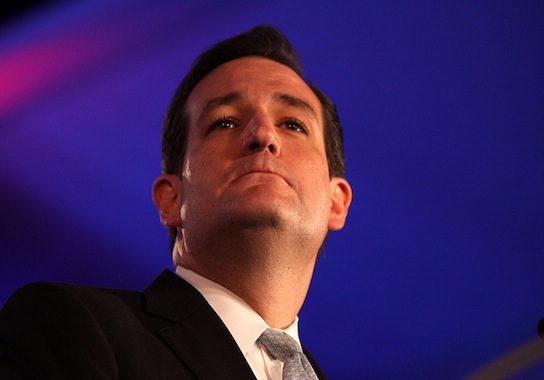What Ted Cruz and Don Quixote Have in Common

New York Times columnist Nicholas Kristof compared Senator Ted Cruz to Don Quixote in a Thursday column, describing the senator as an impassioned but delusional knight-errant charging windmills of Obamacare terror. “Cruz is a smart man, and maybe this is just disingenuous demagoguery,” he said. “But there’s a scarier possibility: After spending too much time in the Republican echo chamber, he may believe what he says.”
Kristof invokes a right-wing media bubble so potent it “tugs the entire Republican Party to the right and that transforms people like Cruz into crusading Don Quixotes.” He has a point—it’s easy to uncover murmurs of conspiracy and fear in the Republican Party, and it’s embarrassing at times to see the naiveté fostered in our discourse by a lack of openness, refusal to appreciate alternate points of view, and disdain for the beliefs of others.
But Kristof is wrong to level this charge only at the right; the left shares its own collection of giants-actually-windmills. Salon’s front page Thursday included a film review of a horror flick about a fictional cannibal Christian family. This was their deck: “a gruesome horror film becomes an indie mood piece on the dangers of religion.”
Media bubbles do indeed produce an echo-chamber effect, but that would do little if they were not echoing the rhetoric of a crusader. Don Quixote’s power lies in his make-believe nobility. Today’s parties—left and right—are similarly entranced by their own grandiose myths. The sound of crusading greatness, of superior dogma, sings sweetly in our ears. Yet so much of politics is commonplace, stale, and frustrating. We gild our windmills and mount our invisible steeds in an attempt to embellish it all. But how much of politics is really so grand or straightforward?
Don Quixote wanted to seek the true, good, and beautiful. But his desire for greatness prevented him from confronting the real world. Leon Hadar described a similar sentiment in “Why ‘This Town’ Loves Going to War”:
Ask yourself why there is this continual effort by the Beltway insiders and journalists to elevate foreign policy and national security to the top of the agenda. Could it be because they believe a “player” in Washington has a better chance of drawing public and media attention, of gaining recognition, and of accumulating power when he or she is dealing with matters of war and peace as opposed to, say, the makeup of the next budget?
Hadar is right: politicians prefer the language of war and peace to boring policy postulations. So don’t be surprised if they begin speaking of budgetary issues in warlike terms—politics become more palatable with a little ideological sugarcoating. Perhaps this explains Cruz’s statement, “Everyone in America knows Obamacare is destroying the economy.” Or when he compared acceptance of the Affordable Care Act to Chamberlain’s appeasement of Nazis. Turning politics and policy into black-and-white battles is easy. It makes everything simple. As simple as charging at imaginary giants.
Comments